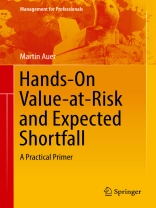This book describes a maximally simple market risk model that is still practical and main risk measures like the value-at-risk and the expected shortfall. It outlines the model’s (i) underlying math, (ii) daily operation, and (iii) implementation, while stripping away statistical overhead to keep the concepts accessible. The author selects and weighs the various model features, motivating the choices under real-world constraints, and addresses the evermore important handling of regulatory requirements. The book targets not only practitioners new to the field but also experienced market risk operators by suggesting useful data analysis procedures and implementation details. It furthermore addresses market risk consumers such as managers, traders, and compliance officers by making the model behavior intuitively transparent.
A very useful guide to the theoretical and practical aspects of implementing and operating a risk-monitoring system for a mid-size financial institution. It sets a common body of knowledge to facilitate communication between risk managers, computer and investment specialists by bridging their diverse backgrounds.
Giovanni Barone-Adesi — Professor, Universitá della Svizzera italiana
This unassuming and insightful book starts from the basics and plainly brings the reader up to speed on both theory and implementation.
Shane Hegarty — Director Trade Floor Risk Management, Scotiabank
Visit the book’s website at www.value-at-risk.com.
Table des matières
1 Introduction.- 2 Motivation.- Part I MEASURES.- 3 Basic Terms and Notation.- 4 Historical Value-at-Risk.- 5 Sensitivities.- 6 Stress Tests.- 7 Analytical Value-at-Risk.- 8 Expected Shortfall.- 9 Model Choices.- 10 A Monte Carlo Modi cation.- 11 Support Measures.- Part II OPERATIONS.- 12 Properties of Va R.- 13 Properties of ES.- 14 Va R Noise.- 15 Backtesting.- 16 Distribution Test.- 17 Nine to Five.- Part III SETUP.- 18 Context.- 19 Scope and Workflow.- 20 Implementation.- PART IV WRAP-UP.- 21 Conclusion.- 22 Acknowledgments.- APPENDIX.
A propos de l’auteur
Martin Auer is senior consultant in the areas of quantitative finance, market and credit risk, and IT, working for the likes of Raiffeisen Bank International, Kommunalkredit, and T-Systems in Vienna, and for Bank of America in New York. He holds degrees in computer science, mathematics, and mathematics of finance from Vienna University of Technology, University of Vienna, and Columbia University.












